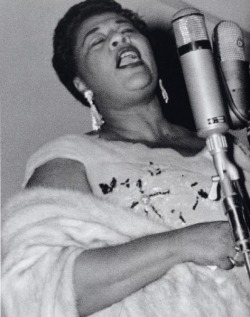The Impact

Ella Fitzgerald had an everlasting impact on, not only how jazz music sounded, but also who performed it. She was named the First Lady of Jazz for a reason, which was that she was the first successful woman to perform jazz music. This alone opened many doors for women everywhere who had the dream of pursuing a career in the performing arts. She also composed her own material as well as doing covers, which was unusual for the times. Most people had a staff of writers who wrote for them, whereas she was creative enough and bold enough to put her songs into the public domain. Before Fitzgerald’s time, there were not that many women who sang, let alone held a job. Because of her, women were taken more seriously in what they thought and in what they wanted to do with their lives. Fitzgerald was taught the hard way through life experiences that it is important to take charge of your life. A symbol that emerged from the jazz era was that of a “flapper”. She was the woman who had short hair, wore a short dress or skirt, wore excessive amounts of makeup, smoked cigarettes, chose their partner instead of having them selected for them, and had an independent mind. Fitzgerald embraced this image, to a certain point, which influenced many women to follow the ever-growing trend. “An independent mind” is the most revolutionary part of this new movement because women were thought to be their husband’s “property” and ought to obey what they said. After the 19’th amendment was passed, women could vote, but almost as important, they had financial independence, which meant they did not have to depend on their husband’s money. After this, the percent of employed women hit a high that people would not have thought to be possible. Because of Ella Fitzgerald’s high celebrity status, what she did, others followed. Having two husbands – and divorcing both of them – and holding a job that was not the typical woman’s job like secretarial work or teaching, she proved that a woman can be financially independent, that a woman does not need a husband to support her, that she can hold a non-traditional job, and that it is not only okay to think independently, but a necessity.
